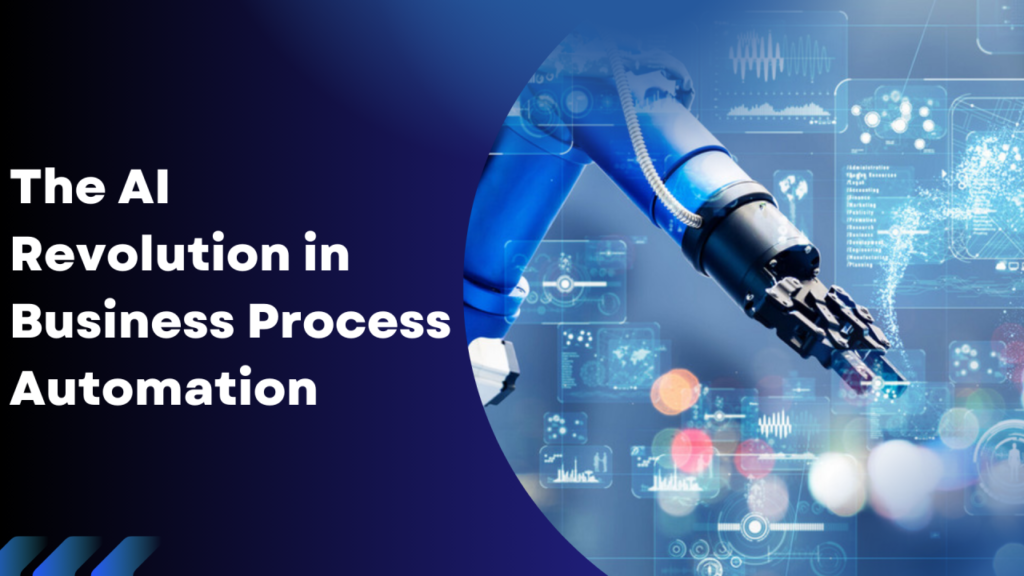In recent years, Artificial Intelligence (AI) has revolutionized the way businesses operate, offering new possibilities for increasing efficiency and driving innovation. As organizations continue to integrate AI into various aspects of their business processes, they are finding new ways to streamline operations, enhance decision-making, and foster a culture of innovation.
Enhancing Operational Efficiency through AI
One of the key roles of AI in Business is improving operational efficiency. AI automates repetitive tasks, freeing up employees to focus on higher-value activities. For example, Business Process Management (BPM) systems now incorporate AI to optimize workflows, reducing the likelihood of errors and improving overall productivity. Whether it’s automating administrative tasks or simplifying data entry, AI is helping businesses run smoother, faster, and more efficiently.

AI-Powered Automation and Business Process Management
Business Process Management (BPM) is another area where AI is making significant strides. AI-driven BPM systems can analyze and predict patterns in processes, enabling companies to make informed decisions. AI helps businesses identify inefficiencies, optimize resources, and ultimately reduce costs. Moreover, with AI, BPM systems can provide real-time insights that aid in faster decision-making and more agile business practices.

Predictive Maintenance and Asset Optimization
Predictive maintenance, powered by AI, has become a game-changer for industries reliant on equipment and machinery. AI algorithms analyze data from machines to predict potential failures before they happen. This proactive approach to maintenance helps businesses minimize downtime, reduce costs, and optimize the lifespan of their assets. By leveraging predictive analytics, companies can ensure continuous operations without costly disruptions.

AI in Sales and Marketing
AI in Sales and Marketing has opened new avenues for engaging with customers. AI tools such as chatbots and automated messaging systems improve customer service by providing immediate responses to queries. Additionally, AI enables businesses to tailor marketing efforts based on customer behavior, increasing engagement and conversion rates. AI-driven analytics help sales teams identify patterns in customer data, enabling personalized experiences that drive sales growth.

AI in Product Development and Innovation
When it comes to product development, AI helps businesses stay ahead of the competition by providing deep insights into customer preferences and market trends. AI-powered tools can quickly analyze large datasets, allowing companies to make informed decisions about future product offerings. In the innovation space, AI is enabling businesses to prototype faster, test more effectively, and bring new products to market in record time.
AI in Human Resources: Streamlining Recruitment and Employee Engagement
AI in Human Resources has simplified the recruitment process by automating routine tasks such as resume screening and interview scheduling. AI tools can analyze candidates’ qualifications more effectively than manual reviews, leading to more accurate hiring decisions. Moreover, AI-powered platforms can analyze employee data to monitor engagement levels, assess productivity, and recommend improvements, helping to maintain a healthy work environment.
Customer Support and Personalization
The use of AI in customer service helps businesses create more personalized customer experiences. AI-driven systems can analyze customer interactions and provide tailored support based on individual preferences and needs. This level of personalization builds stronger customer relationships, increases satisfaction, and boosts loyalty. AI systems can also efficiently handle multiple customer queries simultaneously, improving response times and overall service quality.
AI-Driven Trend and Sentiment Analysis
Businesses today use AI to conduct trend and sentiment analysis, giving them valuable insights into customer preferences, market movements, and overall brand perception. AI can sift through vast amounts of data, from social media posts to customer reviews, to identify emerging trends or shifts in sentiment. By understanding these patterns, businesses can adjust their strategies to better align with market demands and customer expectations.
Predictive Analytics and Business Intelligence
Predictive analytics allows businesses to forecast trends and outcomes based on data patterns. By applying AI to business intelligence, companies can anticipate customer behaviors, market shifts, and even financial outcomes. This predictive capability enables businesses to make smarter, data-driven decisions, allocate resources more effectively, and stay ahead of the competition.
Challenges in Implementing AI in Business
While AI offers numerous benefits, implementing it successfully poses certain challenges. Businesses must address issues such as data privacy, the need for skilled personnel to manage AI systems, and the costs of integrating AI into existing workflows. Additionally, there are ethical considerations surrounding AI, especially when it comes to data collection and usage.
The Future of AI in Business: Innovation and Beyond
Looking ahead, the future of AI in Business is filled with potential. AI technologies will continue to evolve, providing businesses with more powerful tools for innovation. From real-time data analytics to innovative AI applications, the possibilities are limitless. Companies that embrace AI will be better positioned to lead in their industries, adapt to changing markets, and create entirely new business models.
Conclusion
AI is not just a tool for increasing efficiency—it’s a driving force behind business innovation. As AI technologies continue to advance, businesses that integrate AI into their operations will not only streamline processes but also unlock new levels of creativity and innovation. By staying informed about AI trends and best practices, businesses can ensure long-term success in an increasingly competitive landscape.
AI in Business, providing insight into how AI improves efficiency across various sectors. From Business Process Management (BPM) to AI in Sales and Marketing, companies are utilizing AI to streamline operations, innovate products, and foster customer engagement. By following these trends and addressing the challenges of AI implementation, businesses can ensure they stay competitive in the evolving digital landscape.






3 thoughts on “AI in Business: Boosting Efficiency and Driving Innovation”
Comments are closed.